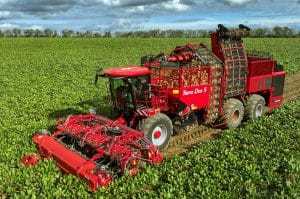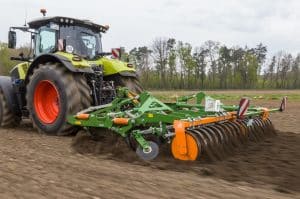The EXEL Industries Group generated revenue of €281.4 million in the second quarter of the 2024-2025 fiscal year, down -3.8% on the previous year. Mainly this was due to lower volumes in Agricultural Spraying, with other activities either stable or growing, particularly sugar beet harvesting.
Agricultural Spraying revenue was down 15.7%, due to low volumes, in line with the first quarter, with a return to a more traditional seasonality. In Europe, sales were up slightly, with some disparities depending on the country. However, revenue was significantly impacted in North America. The current situation is encouraging North American farmers to adopt a general wait-and-see attitude due to a lack of economic visibility stemming from the trade war of the Trump presidency and pressures on agricultural revenues.
There are positive signs as well. Sales in sugar beet harvesting were up 47.6%. All product categories (harvesters, cleaner-loaders and carriers) increased, after a first quarter marked by a slight delay in production schedules, which was resolved as expected. Sales of spare parts and used machinery remained strong and increased compared to the same period last year.
“EXEL Industries had a solid second quarter, showing the capacity of its activities to withstand a difficult and unstable economic environment”, says Daniel Tragus, Chief Executive Officer of the EXEL Industries Group. “Despite declining volumes, Agricultural Spraying benefitted from our diverse presence in Europe, Australia and North America, while our sales in the Garden segment remained at a strong level, auguring a satisfactory year. In the Industry division, we continued to grow, reinforcing our position in the market. However, the current climate of macroeconomic uncertainty requires the Group to be more cautious in certain regions, notably in North America.”
2025 outlook
Order intake in spraying, at low levels, continues to provide limited visibility, but is beginning to show the first signs of recovery, mainly in Europe and in large-scale crop markets. The outlook for wine markets in Europe remains uncertain for the nearby future.
In Europe, sales of a large part of dealer inventories, which had reached record levels, should revitalize the market. The Group continues to adjust its production capacities and cost structure to the current level of business.
The situation in the agricultural equipment market in North America remains uncertain. Pending clarification on pricing policies, order levels remain low. The Group is currently assessing the effects of these policies on the costs and supply chains of its machinery.

![RightSpot Ad Template Digital-1400×190-px[76] Ag Leader RightSpot](https://world-agritech.com/wp-content/uploads/elementor/thumbs/RightSpot-Ad-Template-Digital-1400x190-px76-r316mmc0hgoob9qxmklllnnbxta1nlj7t2vjkoyeek.png)







